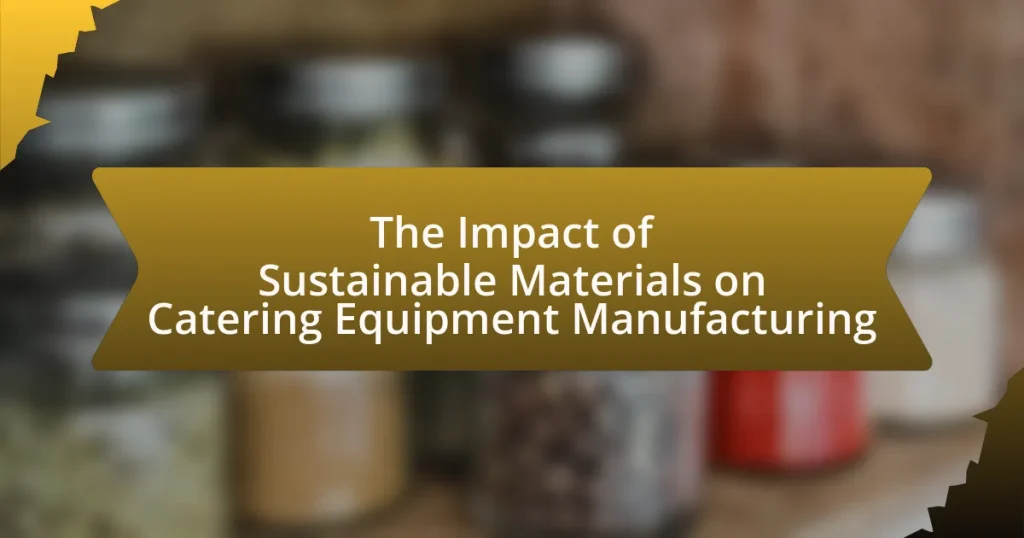The article focuses on the impact of sustainable materials in catering equipment manufacturing, highlighting their role in minimizing environmental impact while ensuring functionality and durability. It defines sustainable materials as resources like recycled metals, biodegradable plastics, and sustainably sourced wood, which contribute to reduced waste and energy consumption. The discussion includes the types of sustainable materials, their importance in manufacturing, and the long-term environmental benefits they offer. Additionally, the article addresses the economic implications, market demand, and best practices for manufacturers to adopt sustainable materials, emphasizing the growing consumer preference for eco-friendly products in the catering industry.
What are Sustainable Materials in Catering Equipment Manufacturing?
Sustainable materials in catering equipment manufacturing are resources that minimize environmental impact while maintaining functionality and durability. These materials include recycled metals, biodegradable plastics, and sustainably sourced wood, which reduce waste and energy consumption during production. For instance, using recycled stainless steel can decrease energy usage by up to 75% compared to producing new steel, demonstrating a significant reduction in carbon footprint. Additionally, biodegradable plastics can break down naturally, reducing landfill contributions. The adoption of these materials not only supports environmental sustainability but also aligns with increasing consumer demand for eco-friendly products in the catering industry.
How are sustainable materials defined in the context of catering equipment?
Sustainable materials in the context of catering equipment are defined as resources that are sourced, produced, and utilized in a manner that minimizes environmental impact and promotes resource conservation. These materials often include recycled metals, biodegradable plastics, and sustainably harvested wood, which contribute to reducing waste and energy consumption during manufacturing and usage. For instance, using recycled stainless steel in catering equipment can significantly lower carbon emissions compared to virgin steel production, as it requires less energy and reduces the demand for raw materials.
What types of materials are considered sustainable?
Sustainable materials include bamboo, recycled metals, organic cotton, and reclaimed wood. Bamboo is rapidly renewable and requires minimal resources to grow, making it an eco-friendly choice. Recycled metals, such as aluminum and steel, reduce the need for virgin materials and lower energy consumption during production. Organic cotton is grown without synthetic pesticides or fertilizers, promoting healthier ecosystems. Reclaimed wood repurposes existing materials, minimizing waste and deforestation. These materials contribute to reducing environmental impact and promoting sustainability in manufacturing processes.
Why is the choice of materials important in catering equipment manufacturing?
The choice of materials is crucial in catering equipment manufacturing because it directly affects durability, safety, and sustainability. High-quality materials ensure that equipment can withstand the rigors of commercial use, reducing the need for frequent replacements and maintenance. For instance, stainless steel is often preferred for its resistance to corrosion and ease of cleaning, which are essential in food service environments. Additionally, the use of sustainable materials, such as recycled metals or biodegradable plastics, aligns with environmental regulations and consumer preferences for eco-friendly products. Research indicates that using sustainable materials can reduce the carbon footprint of manufacturing processes by up to 30%, highlighting the importance of material selection in promoting both operational efficiency and environmental responsibility.
What role do sustainable materials play in environmental impact?
Sustainable materials significantly reduce environmental impact by minimizing resource depletion and waste generation. These materials, such as bamboo, recycled metals, and biodegradable plastics, require less energy to produce and often have a lower carbon footprint compared to conventional materials. For instance, using recycled aluminum can save up to 95% of the energy required to produce new aluminum from raw materials. Additionally, sustainable materials often contribute to a circular economy, where products are designed for reuse and recycling, further decreasing landfill waste and pollution. This approach not only conserves natural resources but also promotes environmental stewardship within industries, including catering equipment manufacturing.
How do sustainable materials reduce carbon footprints in manufacturing?
Sustainable materials reduce carbon footprints in manufacturing by minimizing resource extraction and energy consumption during production. These materials, such as recycled metals and bioplastics, often require less energy to process compared to traditional materials, leading to lower greenhouse gas emissions. For instance, using recycled aluminum can save up to 95% of the energy needed to produce new aluminum from raw ore. Additionally, sustainable materials often have a longer lifecycle and can be biodegradable or recyclable, further reducing waste and emissions associated with disposal. This holistic approach not only decreases the carbon footprint during manufacturing but also contributes to a more sustainable supply chain overall.
What are the long-term environmental benefits of using sustainable materials?
The long-term environmental benefits of using sustainable materials include reduced resource depletion, lower greenhouse gas emissions, and enhanced biodiversity. Sustainable materials, such as bamboo and recycled metals, require fewer natural resources to produce, thereby conserving ecosystems and minimizing habitat destruction. For instance, using bamboo can reduce deforestation rates, as it grows rapidly and can be harvested sustainably. Additionally, sustainable materials often have a smaller carbon footprint; for example, the production of recycled aluminum emits 95% less greenhouse gas compared to new aluminum production. This significant reduction in emissions contributes to climate change mitigation. Furthermore, sustainable practices promote biodiversity by encouraging the use of materials sourced from responsibly managed forests and farms, which helps maintain healthy ecosystems.
How do Sustainable Materials Affect the Catering Equipment Industry?
Sustainable materials significantly influence the catering equipment industry by promoting eco-friendly practices and reducing environmental impact. The adoption of materials such as bamboo, recycled metals, and biodegradable plastics leads to lower carbon footprints during production and disposal. For instance, using recycled aluminum can reduce energy consumption by up to 95% compared to producing new aluminum. Additionally, the shift towards sustainable materials aligns with consumer demand for environmentally responsible products, driving innovation and competitiveness within the industry. This trend is supported by research indicating that 66% of global consumers are willing to pay more for sustainable brands, highlighting the economic benefits of integrating sustainable materials in catering equipment manufacturing.
What changes have manufacturers made to incorporate sustainable materials?
Manufacturers have increasingly adopted sustainable materials by integrating recycled plastics, biodegradable substances, and renewable resources into their products. For instance, many catering equipment manufacturers now utilize recycled stainless steel and aluminum, which significantly reduces the carbon footprint associated with raw material extraction and processing. Additionally, some companies are replacing traditional plastics with bioplastics derived from corn starch or sugarcane, which decompose more easily and lessen environmental impact. This shift is supported by industry reports indicating that over 60% of manufacturers are prioritizing sustainability in their material sourcing strategies, reflecting a growing commitment to environmental responsibility in catering equipment manufacturing.
How has the production process evolved with sustainable materials?
The production process in catering equipment manufacturing has evolved significantly with the integration of sustainable materials, leading to reduced environmental impact and enhanced efficiency. Manufacturers now prioritize materials such as recycled metals, biodegradable plastics, and sustainably sourced wood, which not only minimize waste but also lower carbon footprints. For instance, the use of recycled aluminum can reduce energy consumption by up to 95% compared to producing new aluminum. Additionally, advancements in technology have enabled more efficient manufacturing processes, such as 3D printing with sustainable materials, which reduces material waste and allows for more innovative designs. This shift towards sustainability is driven by increasing consumer demand for eco-friendly products and regulatory pressures aimed at reducing environmental harm.
What challenges do manufacturers face when transitioning to sustainable materials?
Manufacturers face several challenges when transitioning to sustainable materials, including higher costs, supply chain limitations, and technical performance issues. The initial investment required for sustainable materials often exceeds that of traditional materials, making it financially burdensome for manufacturers. Additionally, the availability of sustainable materials can be inconsistent, leading to supply chain disruptions. Technical performance can also be a concern, as sustainable alternatives may not always meet the same standards as conventional materials, impacting product quality and durability. These challenges are supported by industry reports indicating that cost and supply chain issues are among the top barriers to adopting sustainable practices in manufacturing.
What are the economic implications of using sustainable materials?
The economic implications of using sustainable materials include reduced long-term costs, increased market competitiveness, and potential for government incentives. Sustainable materials often lead to lower energy consumption and waste reduction during production, which can decrease operational costs over time. For instance, a study by the Ellen MacArthur Foundation found that transitioning to a circular economy, which emphasizes sustainable materials, could generate $4.5 trillion in economic benefits by 2030. Additionally, businesses that adopt sustainable practices may attract environmentally conscious consumers, enhancing their market position. Furthermore, many governments offer tax breaks or subsidies for companies that utilize sustainable materials, providing financial incentives that can improve profitability.
How do sustainable materials impact production costs?
Sustainable materials generally increase production costs due to their higher initial prices and the need for specialized processing. For instance, materials like bamboo or recycled metals often require more advanced technology and labor to source and manufacture, which can lead to increased expenses. Additionally, the supply chain for sustainable materials may be less established than for conventional materials, resulting in higher logistics costs. However, these costs can be offset over time through benefits such as reduced energy consumption, lower waste disposal fees, and potential tax incentives for using eco-friendly materials.
What is the market demand for catering equipment made from sustainable materials?
The market demand for catering equipment made from sustainable materials is increasing significantly. According to a report by Grand View Research, the global green catering equipment market is projected to grow at a compound annual growth rate (CAGR) of 5.6% from 2021 to 2028, driven by rising consumer awareness of environmental issues and a shift towards eco-friendly practices in the food service industry. Additionally, a survey conducted by the National Restaurant Association found that 60% of restaurant operators are actively seeking sustainable products, indicating a strong preference for catering equipment that minimizes environmental impact.
What are the Benefits of Sustainable Materials in Catering Equipment Manufacturing?
Sustainable materials in catering equipment manufacturing offer numerous benefits, including reduced environmental impact, enhanced durability, and improved health safety. By utilizing materials such as bamboo, recycled metals, and biodegradable plastics, manufacturers can significantly lower carbon emissions and waste generation during production. For instance, using recycled aluminum can reduce energy consumption by up to 95% compared to producing new aluminum. Additionally, sustainable materials often possess greater longevity, leading to lower replacement rates and reduced resource consumption over time. Furthermore, catering equipment made from non-toxic, sustainable materials contributes to healthier environments for both workers and consumers, aligning with increasing regulatory standards and consumer preferences for eco-friendly products.
How do sustainable materials enhance product quality?
Sustainable materials enhance product quality by improving durability, performance, and safety. For instance, materials like bamboo and recycled metals are often stronger and more resilient than conventional options, leading to longer-lasting products. Additionally, sustainable materials typically undergo less chemical processing, which can reduce the presence of harmful substances, thereby increasing safety for users. Research indicates that products made from sustainable materials often exhibit superior thermal properties, which can enhance functionality in catering equipment. For example, a study published in the Journal of Cleaner Production found that using bioplastics in food containers improved insulation and reduced heat transfer, contributing to better food preservation.
What specific features do sustainable materials provide in catering equipment?
Sustainable materials in catering equipment provide durability, reduced environmental impact, and enhanced safety. These materials, such as bamboo, recycled metals, and biodegradable plastics, are designed to withstand heavy use while minimizing waste and energy consumption during production. For instance, bamboo is known for its strength and rapid renewability, making it a sustainable choice that also contributes to lower carbon footprints. Additionally, using recycled metals can significantly decrease the energy required for manufacturing compared to virgin materials, with studies showing up to 95% less energy consumption. Furthermore, many sustainable materials are free from harmful chemicals, ensuring safer food handling and compliance with health regulations.
How do these features improve user experience and satisfaction?
Sustainable materials in catering equipment manufacturing enhance user experience and satisfaction by providing eco-friendly options that align with consumer values. These materials often lead to improved durability and performance, resulting in less frequent replacements and lower long-term costs for users. For instance, equipment made from recycled metals or biodegradable plastics can withstand high usage while minimizing environmental impact, which appeals to environmentally conscious consumers. Additionally, the use of sustainable materials can enhance the aesthetic appeal of products, making them more attractive in commercial settings. This combination of functionality, cost-effectiveness, and visual appeal contributes to higher user satisfaction and loyalty.
What are the social implications of using sustainable materials?
The social implications of using sustainable materials include enhanced community well-being and increased social equity. By prioritizing sustainable materials, companies contribute to environmental preservation, which in turn fosters healthier living conditions for communities. For instance, the use of renewable resources reduces pollution and conserves ecosystems, leading to improved public health outcomes. Additionally, sustainable practices often promote fair labor conditions and support local economies, as many sustainable materials are sourced from local suppliers. This approach can create job opportunities and empower marginalized communities, thereby addressing social inequalities. Studies have shown that businesses adopting sustainable practices can enhance their reputation and customer loyalty, further reinforcing positive social impacts.
How do sustainable materials contribute to corporate social responsibility?
Sustainable materials contribute to corporate social responsibility by minimizing environmental impact and promoting ethical practices. Companies that utilize sustainable materials reduce waste, lower carbon emissions, and conserve natural resources, aligning their operations with social and environmental goals. For instance, a study by the Ellen MacArthur Foundation highlights that using recycled materials can significantly decrease the ecological footprint of manufacturing processes. This commitment to sustainability enhances a company’s reputation, fosters consumer trust, and can lead to increased customer loyalty, as consumers increasingly prefer brands that demonstrate social responsibility.
What role do consumers play in promoting sustainable materials in catering equipment?
Consumers play a crucial role in promoting sustainable materials in catering equipment by driving demand for eco-friendly products. Their purchasing choices influence manufacturers to prioritize sustainable materials, as businesses often respond to consumer preferences to remain competitive. For instance, a survey by the Foodservice Equipment Reports indicated that 70% of operators consider sustainability when selecting equipment, demonstrating that consumer awareness and demand can lead to increased availability of sustainable options in the market. This shift not only encourages manufacturers to innovate with sustainable materials but also fosters a broader industry trend towards environmental responsibility.
What best practices should manufacturers follow when using sustainable materials?
Manufacturers should prioritize sourcing sustainable materials from certified suppliers to ensure environmental integrity. This practice guarantees that the materials meet recognized sustainability standards, such as those set by the Forest Stewardship Council for wood products or the Global Organic Textile Standard for textiles. Additionally, manufacturers should conduct lifecycle assessments to evaluate the environmental impact of materials from production to disposal, enabling informed decisions that minimize waste and energy consumption. Implementing closed-loop systems, where materials are reused or recycled, further enhances sustainability by reducing reliance on virgin resources. According to a report by the Ellen MacArthur Foundation, transitioning to a circular economy can significantly decrease material costs and environmental footprints, validating the importance of these best practices.
How can manufacturers ensure the sustainability of their materials?
Manufacturers can ensure the sustainability of their materials by sourcing renewable resources, utilizing recycled materials, and implementing eco-friendly production processes. Sourcing renewable resources, such as bamboo or sustainably harvested wood, reduces reliance on finite materials and minimizes environmental impact. Utilizing recycled materials, like recycled plastics or metals, decreases waste and conserves energy compared to producing new materials. Implementing eco-friendly production processes, such as reducing water usage and minimizing emissions, further enhances sustainability. According to a report by the Ellen MacArthur Foundation, transitioning to a circular economy, which emphasizes recycling and resource efficiency, can significantly reduce environmental footprints in manufacturing sectors.
What strategies can be implemented to educate consumers about sustainable catering equipment?
To educate consumers about sustainable catering equipment, implementing targeted awareness campaigns is essential. These campaigns can utilize social media platforms, informative websites, and workshops to disseminate knowledge about the benefits and features of sustainable materials used in catering equipment. For instance, research indicates that consumers are more likely to make eco-friendly choices when they are informed about the environmental impact of their purchases, such as reduced carbon footprints and waste generation associated with sustainable products. Additionally, partnerships with industry influencers and chefs can enhance credibility and reach, as they can share personal experiences and endorsements of sustainable catering equipment.



